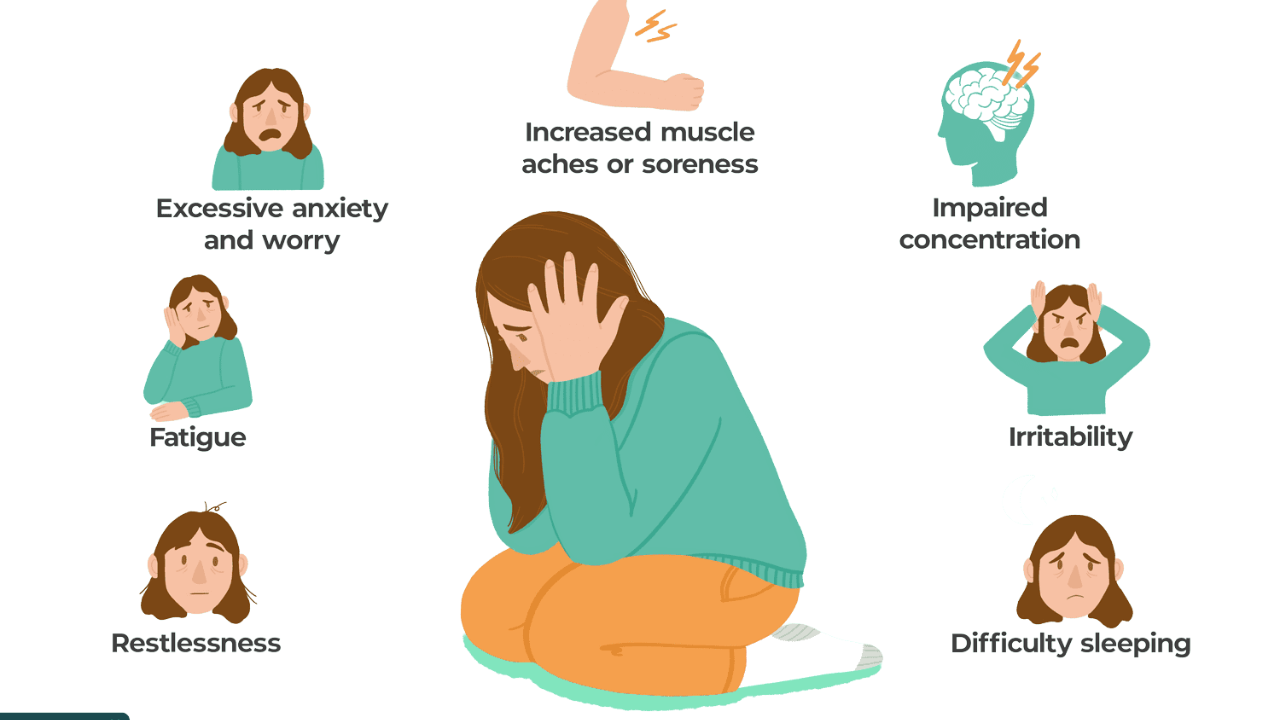Not Sure If You Have Anxiety? Learn the Key Symptoms
Anxiety is something many people experience, but it can be hard to tell if what you're feeling is just everyday stress or something more. While it's normal to feel anxious sometimes, persistent anxiety can start to affect your daily life. Recognizing the symptoms early is the first step to understanding whether anxiety might be impacting you.
In this blog, we’ll explore the key symptoms of anxiety, both physical and emotional, to help you better understand what you're feeling. Whether you’re experiencing constant worry, physical tension, or trouble sleeping, being aware of the signs can help you take the right steps toward feeling better.
What causes generalized anxiety disorder?
Generalized Anxiety Disorder (GAD) is caused by a combination of genetic, environmental, and psychological factors. Genetics play a role, as anxiety disorders tend to run in families, suggesting a hereditary component. Brain chemistry and imbalances in neurotransmitters, such as serotonin and dopamine, can also contribute to the development of GAD. Environmental stressors, such as trauma, abuse, or chronic stress, can trigger or worsen anxiety, especially if someone has a history of mental health issues.
Additionally, certain personality traits, like a tendency to worry excessively or a heightened sensitivity to stress, can make individuals more prone to developing GAD. Life events such as major changes, job stress, or relationship issues can act as triggers for GAD, amplifying the underlying risk factors.
Common Physical Symptoms of Anxiety
Anxiety can cause various physical symptoms that affect the body. These symptoms are the result of the body's "fight or flight" response, which is activated when we feel stressed or fearful. Understanding these signs can help you recognize when anxiety might be taking a physical toll on your health.
Rapid heartbeat or palpitations: Your heart may race or feel like it’s pounding, even when you're not active.
Shortness of breath or difficulty breathing: You might feel like you can’t catch your breath, as if you’re gasping for air.
Muscle tension or soreness, especially in the neck and shoulders: Anxiety can cause tight muscles, leading to pain or stiffness, especially in your neck and shoulders.
Sweating or chills, even without physical activity: You might sweat or feel chills, even when you're not moving or exercising.
Headaches or migraines: Anxiety can trigger headaches or migraines, often feeling like pressure or heaviness in your head.
Gastrointestinal issues, like nausea or diarrhea: Anxiety can upset your stomach, causing nausea or diarrhea.
Dizziness or lightheadedness: You may feel dizzy or lightheaded, as if you might faint.
Fatigue or feeling unusually tired despite adequate sleep: Anxiety can leave you feeling tired all the time, even if you've slept enough.
Emotional and Cognitive Signs
Anxiety can also deeply affect your emotional and cognitive well-being. It often leads to persistent, overwhelming feelings that can make everyday life feel difficult. These emotional and cognitive symptoms are key in recognizing anxiety.
Constant worry or fear: You may feel anxious or fearful about things that aren’t a direct threat, often imagining worst-case scenarios.
Difficulty concentrating: Anxiety can make it hard to focus or stay on track with tasks, as your mind may constantly wander or feel distracted.
Irritability or mood swings: You might feel more irritable than usual, reacting strongly to situations that wouldn’t normally bother you.
Restlessness: Anxiety can make it difficult to relax, leaving you feeling fidgety or like you’re always on edge.
Behavioral Indicators
Anxiety can also change how you behave, influencing your daily actions and decisions. These behavioral signs are important to identify, as they can be some of the earliest indicators that anxiety is affecting your life.
Avoidance of certain situations: You may start avoiding situations or places that make you feel anxious, like social events or crowded areas.
Procrastination or indecisiveness: Anxiety can lead to putting things off or having trouble making decisions, as you fear making mistakes or choosing poorly.
Changes in sleep patterns: Anxiety can disrupt your sleep, either keeping you up at night with racing thoughts or causing you to sleep too much to escape the stress.
Understanding and Managing Anxiety with Support
In conclusion, recognizing the symptoms of anxiety is the first step toward taking control of your mental well-being. Whether it’s physical signs like rapid heartbeat, emotional symptoms like constant worry, or behavioral changes such as avoiding certain situations, understanding these signs can help you address anxiety early. Remember, it's okay to seek help if you're struggling, and you don’t have to face it alone.
At Mass Mind Center, we’re dedicated to supporting you on your journey to mental clarity and emotional resilience. Our expert team offers a range of services designed to help you understand and manage anxiety in a safe and supportive environment. If you’re unsure whether anxiety is affecting your life, we’re here to help you identify the symptoms and find the right path toward feeling better.


